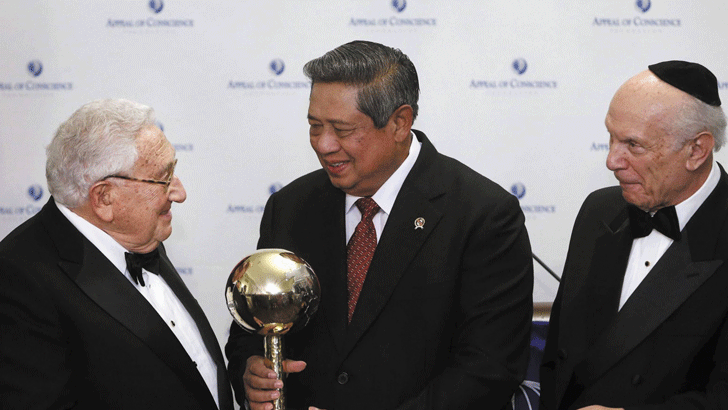Indonesian president’s award an insult

The Appeal of Conscience Foundation (ACF) – a US-based interfaith organisation of business leaders – presented Indonesian President Susilo Bambang Yudhoyono with the World Statesman Award in New York on 30 May, in “recognition of his work in supporting human rights and religious freedom”.
In accepting the award and congratulatory letter from President Barack Obama, Yudhoyono conceded that “pockets” of religious intolerance persist in Indonesia, but insisted his government would not tolerate violence in the name of religion. “We will not allow any desecration of places of worship of any religion for whatever reason. We will always protect our minorities and ensure that no one suffers from discrimination. We will make sure that those who violate the rights of others will face the arms of justice”, he said at an event charging US$10,000-100,000 per table for corporate sponsors.
Outside, under the close watch of New York City police, the East Timor and Indonesia Action Network – which collected 5000 online signatures rejecting the award – held a rally accusing the ACF of polishing Yudhoyono’s image abroad when intolerance was in the rise in Indonesia.
Angry protests
Yudhoyono’s nomination last month was greeted by ridicule and angry protest. The Human Rights Working Group said that he had failed to prevent violence committed in the name of religion or ensure justice for victims, and accused officials of intolerance and persecuting victims.In Jakarta, a coalition representing Ahmadis, Shiites and Christian congregations barred from their places of worship by hardline Islamic groups and local governments protested at the State Palace and US embassy, calling on Yudhoyono to turn down the award. The National Alliance of Unity in Diversity, the Setara Institute for Democracy and Peace and the Wahid Institute said the award was an “insult to victims of religious persecution”.
The day before Yudhoyono departed for the US, hundreds of members of churches closed down by local administrations ridiculed Yudhoyono by presenting him with the World “Statements” Award on Religious Freedom 2013, alluding to his predilection for making statements but doing nothing.
Mainstream Islamic organisations, including the country’s top religious body, the Indonesian Ulema Council (MUI) – which has played a key role in stoking religious violence – gave Yudhoyono their blessing.
Since being elected in 2004, Yudhoyono’s pro-business government has relied on the support of conservative Islamic-based parties. Local governments have pandered to the moral-conservative vote to prop up flagging electoral support by passing sharia-based by-laws and banning “deviant” religious sects – creating an atmosphere that feeds into the agenda of hardline groups, many of which were established with military backing. Minority houses of worship have been vandalised and closed and members of minorities assaulted and killed. Police rarely take action and usually side with attackers, while courts give perpetrators a slap on the wrist and jail victims for defending themselves.
In 2005 the MUI issued an edict against Ahmadiyah, a minority Islamic sect, calling its teachings blasphemous. In 2008 the government enacted a decree banning the group from propagating its beliefs. These actions have resulted in widespread violence against Ahmadi Muslims. Discrimination is also legitimised by the 1965 blasphemy law, which recognises only six religions, in effect outlawing the 250 or more minority faiths in Indonesia. According to the government’s own human rights commission, there at least 100 laws discriminating against minorities.
Government complicity
A report by Human Rights Watch in February noted that since Yudhoyono took office there had been a marked increase in violence targeting minorities, and the government had been complicit with officials and police, facilitating harassment and intimidation by Islamist groups, making discriminatory statements, refusing to issue building permits and pressuring congregations to relocate. Last month Amnesty International and the US State Department also released reports critical of abuses and the government’s failure to protect minorities.
The government responded by claiming Yudhoyono never “asked for the award” or trying to shift the blame onto local governments and police for “ignoring his speeches”. They have belittled critics as “narrow minded”, saying their views are “based only on what they’ve seen on TV”.
Critics consider the entire affair as a publicity stunt engineered by the president’s inner circle and the ACF to boost Yudhoyono’s international stature and dismal approval rating at home before he leaves office next year. The Indonesian embassy was forced to deny newspaper reports that families of consulate, embassy and central bank staff were paid US$100 a head to hold a counter-rally in New York supporting Yudhoyono.
Highlighting the disconnect with reality, on the day Yudhoyono received the award, a joint ministerial meeting reaffirmed curbs on Ahmadiyah’s activities, concluding that the 2008 decree used by hardliners to justify attacks is “the key to curbing violence against the community”. Speaking in Jakarta, religious affairs minister Suryadharma reiterated his view that Ahmadiyah is a “deviant sect” and the best resolution would be for its members to convert to the “right” teachings of Islam.
[For the latest news and information on Indonesia visit asia-pacific-solidarity.net]